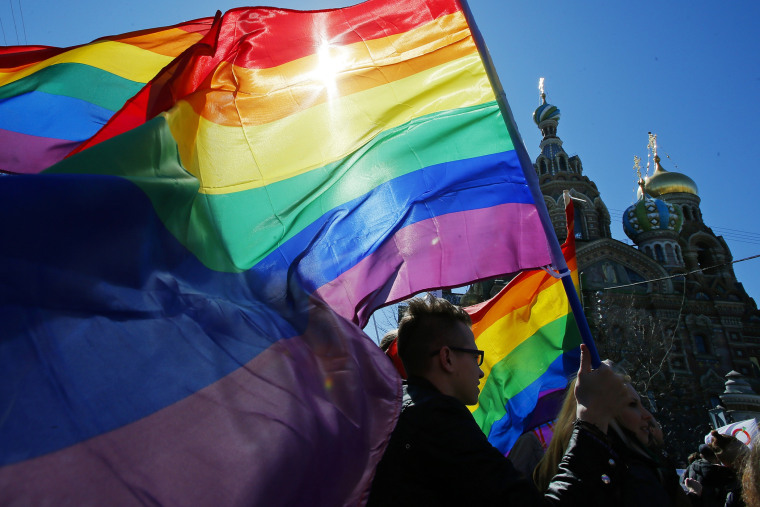Two women got married in Russia last week, becoming what activists are calling the first same-sex couple to legally wed in the country that bans so-called gay "propaganda."
"It was the first (LGBT wedding) in Russia," said Anna Anisimova, an activist working with the Saint Petersburg-based LGBT rights group, Vykhod, to AFP Sunday. "Both brides wore white dresses."
Same-sex marriage is banned in Russia, along with a number of other civil rights and protections for the country's LGBT population; the two women were able to marry in Saint Petersburg because one is transgender and currently undergoing hormone therapy. Her passport still lists her as male, the gender which she was born.
Related: "Russian LGBT advocates brace for life in Olympic shadow"
"It's an insult against thousands of Russian families. I intend to call for its annulment," said Vitaly Milonov, a Russian politician who authored the notorious propaganda law, to AFP. He also told Russian media that the staff at the registry office where the two women were able to marry should be tried for treason or criminal negligence, the BBC reported.
Last year, President Vladimir Putin of Russia signed into law a series of anti-gay measures, the most contentious of which banning the promotion of “nontraditional” sexual relationships among minors. The "propaganda" law drew heavy criticism from the international community in the lead-up to February's Sochi Olympics, but proved to have little impact on the games themselves.
Russia's first same-sex marriage comes days after Latvia's foreign minister, Edgars Rinkevics, declared on Twitter Thursday that he was "proud to be gay." While officials from the European Union, the United States, Estonia, Germany, and Italy saluted Rinkevics' announcement, prominent Russians derided the former Soviet republic. This discrepancy isn't surprising considering that just 16% of Russians said "homosexuality should be accepted by society" in a recent Pew Research Center survey. By contrast, 87% of Germans supported the proposition.
"I don't think [these events] will accelerate a thaw in LGBT opposition," said Rachel Denber, deputy director for Europe and Central Asia at Human Rights Watch, to msnbc. "What's really needed to accelerate a thaw in Russia is for the government to state very clearly that it's unacceptable to engage in hateful and anti-gay rhetoric, that it's unacceptable for public officials to engage in discriminatory rhetoric. If the Russian government investigates violence against LGBT people, and prosecutes that violence as a hate crime, those things may help to turn public opinion around."
RELATED: Bert and Ernie at the center of another gay marriage controversy
Human Rights First's Shawn Gaylord agreed that Russia's same-sex marriage would likely have little impact on anti-gay sentiment within the country, and may even make matters worse for LGBT Russians. But he sounded a more hopeful note about the regional effects of Rinkevics' announcement.
"I do think the Latvia development is great," said Gaylord to msnbc. "There's a lot of research showing how public figures' coming out can have a big impact."
